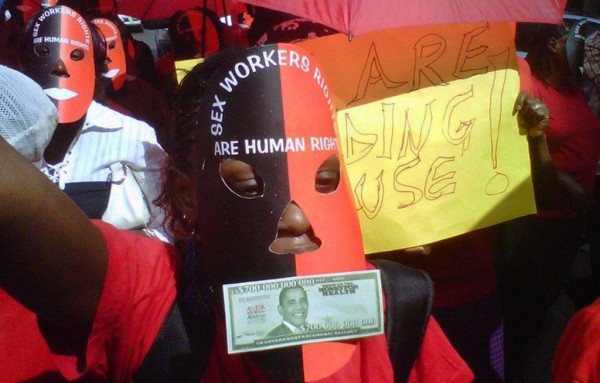What African sex workers want

Sex workers do not need pity or saviours. They do not need cash handouts or sewing machines, or even baptism. Rather they need safer working conditions, protection from violence and arrest, as well as the freedom from stigma and equal pay for their services.
Rather than looking at the ethical, religious or personal stances on sex work, it is important to first acknowledge that sex work has borne the brunt of a highly stigmatizing society, and one whose sexual conservativeness has often clouded, and looked in aghast as those who freely and consensually engage in sex work for money, pleasure or other mutual benefits.
A basic activist definition of sex work is, ‘sex work is the exchange of sex, or other sexual services, for money, gifts, or other sexual services.’ I will not delve into the historical lineage of sex work in Africa, or even map the many ways society has tried to regulate, punish, rehabilitate, and even kill off the sex work profession.
I identify as a sex worker rights activist and I represent a regional network called the African Sex Workers Alliance (ASWA) that amplifies the voices of, and advocates for the human rights of, the diverse community of sex workers living and working in Africa.
African sex workers have tasked ASWA with creating awareness, while advocating for the recognition of sex work and protecting the human rights workers and their right to freedom from discrimination based on their sexual choices and work.
Our values
At the heart of this African sex work movement are three fundamental ideals that we strive to ‘preach’ and promote as critical in our work of representing this diverse community of sex workers, who include male, female, and transgender sex workers. We also include sex workers living with HIV, those who are differently abled, those who use and inject drugs, and those who are refugees, or migrants. Any sex worker living and working in Africa is represented in ASWA.
Acceptance of sex work as work is one of our fundamental values that we promote and seek to have recognized. This value presupposes the recognition of sex work as a legitimate form of earning money and other benefits. As a form of work, or labor, sex workers are therefore entitled to equal and fair compensation for their work, as well as freedom to make meaningful financial decisions with their work, and entitlement to benefits such as medical care, insurance, banking facilities, and other economic emoluments.
Decriminalisation
Another key value is our opposition to all forms of criminalisation and other forms of oppression of sex work, including sex workers, clients, third parties, families, partners and friends. The term ‘third parties’ includes managers, brothel keepers, receptionists, maids, drivers, landlords, hotels that rent rooms to sex workers and anyone else who is seen as facilitating sex work.
There is a crucial distinction between two terms that is frequently blurred in the debate on sex work. Here, I draw your attention to the difference between legalisation and decriminalization of sex work. Under legalisation, sex work is controlled by the Government or other State authorities, and is legal only under certain state-specified conditions e.g. mandatory registration, or HIV and STIs testing, and even taxation. However, decriminalization essentially involves the removal of all laws against any form of sex work or those that touch on sex work. Thus, we must remove punitive offences such as vagrancy, loitering with the intent to commit a crime and solicitation, which are often used to arrest, prosecute and harass sex workers.
Save us from our saviours!
Sex work is diverse. Sex workers are diverse. Thus, our third key take-away is the self-organisation and self-determination of sex workers. Here, I take issue with the many ‘saviours’ that have tried to rehabilitate, or offer alternative means of income to sex workers with no tangible results. Often, these ‘saviours’ ignore the fact that sex workers do not need cash hand outs or sewing machines, or even the rite of baptism, but rather safer working conditions, protection from violence and arrest, as well as the freedom from stigma, and equal pay for their services.
* Denis Nzioka is the Programmes Manager of the African Sex Workers Alliance (ASWA). ASWA amplifies the voices of sex worker-led organisations advocating for rights-based services, freedom from abuse and discrimination, freedom from punitive laws, policies and practices, and self-determination for sex workers. ASWA works primarily with sex worker-led organisations and facilitates sex worker-led capacity building. @DenisNzioka
* THE VIEWS OF THE ABOVE ARTICLE ARE THOSE OF THE AUTHOR/S AND DO NOT NECESSARILY REFLECT THE VIEWS OF THE PAMBAZUKA NEWS EDITORIAL TEAM
* BROUGHT TO YOU BY PAMBAZUKA NEWS
* Please do not take Pambazuka for granted! Become a Friend of Pambazuka and make a donation NOW to help keep Pambazuka FREE and INDEPENDENT!
* Please send comments to [email=[email protected]]editor[at]pambazuka[dot]org[/email] or comment online at Pambazuka News.
